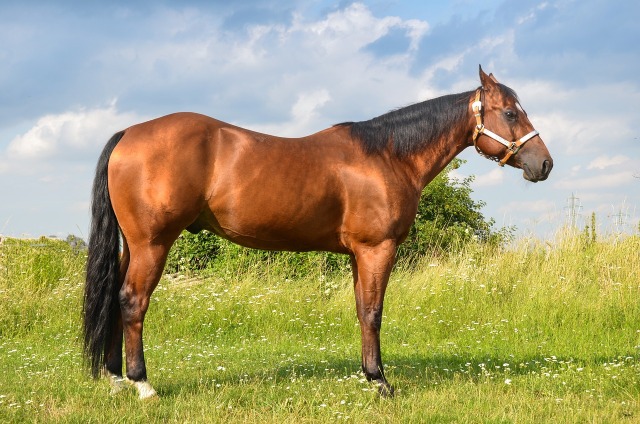I have been receiving an increasing number of questions regarding how to treat a horse with MIM. What is MIM?

MIM is being proposed as a new term for horses with PSSM2
MIM stands for muscle integrity myopathy. It’s unclear where it originated but apparently it was in Europe, possibly with the German genetics lab Generatio.
PSSM2 is currently the moniker for any biopsy showing accumulation of glycogen in abnormal locations that is not positive for the genetic test for PSSM1 – the GYS-1 mutation.
While the name polysaccharide storage myopathy does not tell you anything about the disease process, it is descriptive of the pathological changes. Muscle integrity myopathy isn’t an improvement. In fact, it is described as a group of exertional myopathies, which means exercise brings it on, but they go on to describe some with weakness and muscle atrophy, with no mention of exercise as a trigger.
The main problem though is this entire collection of myopathies is based entirely on the test results from the EquiSeq screen, which has never been validated as actually detecting any genetic myopathy, even after being in business for 8 years and promising to publish.
EquiSeq even has the nerve to state on their web site that the University of Minnesota is collaborating with them, when scrutinizing would be more accurate.
Reaction among the veterinary community in Europe has not been positive either, from the premier equine community at Utrecht University https://www.uu.nl/en/news/pssm-in-horses-a-summary-of-the-scientific-facts to the British Equine Veterinary Association https://www.veterinary-practice.com/2023/beva-warns-against-the-use-of-unvalidated-genetic-tests-for-pssm2-mfm-and-mim .
Pay particular attention to the two articles linked in the BEVA statement which specifically refute the validity of several of EquiSeq’s tests. The American College of Genetics and Genomics in conjunction with the Association for Molecular Pathology has published guidelines for describing genetic variants as pathogenic, likely pathogenic, uncertain, likely benign or benign and what needs to be done to ascertain the significance of any given variant https://www.ncbi.nlm.nih.gov/pmc/articles/PMC4544753/ . There is no evidence that EquiSeq or it’s cohort Generatio are doing that.
There seems to be no shortage of unproven approaches to diagnosis and treatment of horses. That will probably continue as long as people like the founder of EquiSeq describe horse owners as “a niche market with money to burn” https://www.krqe.com/news/albuquerque-entrepreneurs-pitch-for-shark-tank-like-contest/
Don’t get taken in.
Eleanor Kellon, VMD
Thank you so much for all the reliable information you provide. It’s great to have a trustworthy source of information on such important topucs.
LikeLike
Sara,
There are many possibilities but I suggested testing for Lyme because it can present in a host of different ways.
LikeLike
Shelley,
Good question because there is definitely such a thing as seronegative Lyme. Cornell’s Lyme panel is the best available. Otherwise, you could try to talk your vet into a one month trial of doxycycline.
LikeLike
Thank you for providing more information on PSSM. I am struggling with poor body condition on my 17 year old OTTB PSSM2 mare (“diagnosed” via genetic line), though her muscles themselves are not tense. I look forward to continued articles on the subject!
LikeLike
Although not impossible, it’s probably not PSSM2. At her age I would test for early Cushing’s with a TRH stimulation test. You could also try HMB, 10 grams twice a day https://purebulk.com/products/calcium-hmb .
LikeLike
Thank you for the reply! I am open to testing her for cushings. When a bodyworker suggested that she might have PSSM and I had here ancestry analyzed, I then changed her diet and it improved her general comfort and muscle spasms (hence my reference to her muscles not being tense). Had that comment prodded you to think that she does not have PSSM or were there other factors? Thanks for the recommendation of HMB. Do you offer consults? I believe my mare and I are on the right track right now, as she is improving in body condition after switching barns a month ago, but I am always open to resources. Thank you.
LikeLike
I said not likely PSSM because she’s a Tb. I would try the HMB first but yes, you can contact me for consultations at drkellon@madbarn.com.
LikeLike
I already got taken in by Equisec. More money wasted to determine my mare’s mystery illness.
LikeLike
I’m sorry to hear that. Have you checked for Lyme?
LikeLike
DrKellon, is there a valid test for chronic Lyme?
LikeLike
no I have not. It’s so intermittent and not a visible lameness per se. Just intermittent listlessness and obviously feeling awful. Will not go forward under saddle during those episodes.
LikeLike
thank you for this explanation and breakdown of its history. It is so needed and appreciated.
LikeLike